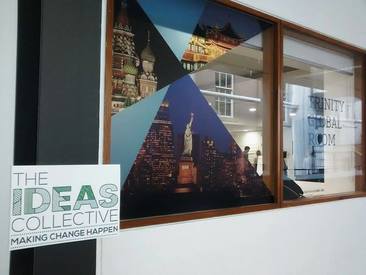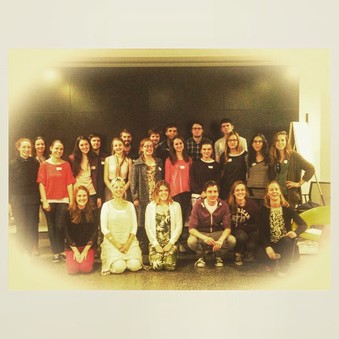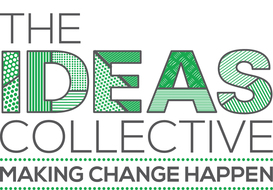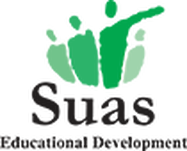BlogStories, Research & Projects
|
 Trinity Global Room, TCD Trinity Global Room, TCD I’ve just come in the door from the first weekend session for The Ideas Collective. First thing I did was boil the kettle, took my boots off. Now I’m sitting down to digest the past two days - from 10am to 6pm on Saturday 6 June and Sunday 7 June 2015. I know I’m involved in something special. I don’t know what I had expected; I suppose I thought we'd be educated as to how to get our social project up and running. I thought we’d learn how to go about approaching funders and engaging stakeholders. And yes, we are learning that stuff. But I’m absorbing so much more. The sessions took place in TCD and were facilitated by three SUAS staff members – Gráinne, Dee (Deirdre) and Jo. They’ve each been so approachable and, since it’s a pilot scheme for SUAS, it's a new experience for everyone involved - so Gráinne, Dee and Jo have been participating alongside the rest of us. It’s created a really collaborative space, where we all feel like we're on a level playing-field. Then there’s the external facilitator, Amanda, an English lady who travels the world giving courses on Leadership. The whole team is excellent and they’ve created an atmosphere that’s warm and energised. It is also very challenging. I don’t mean that in a negative way. I don’t feel intimidated or pressurised, but I do feel anxious. I'll explain below. On Sunday, we met Anthony Haughey, an artist who works on social and politically-charged issues, such as citizenship and direct provision in Mosney Reception Centre, Co. Dublin. I spoke to him about my studies of Agamben during my Master’s and the concept of bare life. My memory was very hazy, but I was very affected by the conceptions of society I studied during my LLM – and they have indirectly led me to my involvement in The Ideas Collective. In the afternoon, we met Conall O’Caoimh and learned about his work with Value Added in Africa. After spending the day discussing amongst ourselves ways to get our project off the ground, Conall’s experience took our perspective to another level. The international scope of his work is baffling – and, to be honest, it makes me nervous about my own capacity to enter this field. I'm worried that I will take myself down a path that may do harm to others and may affect my own career negatively. But I keep reminding myself that these fears were (and are) probably shared by Conall and every other social entrepreneur who spends their time and energy devising an innovative approach to address a problem. I suppose I'm still in the confidence-building stage.  And it’s draining. Of course, I’m challenging myself to ensure I step out of my comfort zone and towards a creative place. I’m conscious that I’m using ‘entrepreneurial’ jargon at this point, but I’m also realising how much of the media that I consume is sending me the same messages. Whether it’s videos, articles, blogs or podcasts, much of the thinking I've exposed myself to over the past few years has been telling me to push forward a project like this. I suppose in the internet age, when new technology companies have attained megalithic status within a very short time, it is accepted thinking that this type of “success” is possible. In an environment where (in theory) everyone is equally empowered by the internet, anything is possible. If you have an idea, we're told that we can put it into practice. This is a positive attitude, and a very capitalist approach. So my eyes have been opened a bit wider to the fact that my decision to involve myself in The Ideas Collective is probably the culmination of years of consideration. After hundreds of moments wondering whether I could ever do this, I’ve finally taken the decision to start. Of course, it doesn’t mean I'll get anywhere with my idea. At the minute, it’s still a very rough outline and I haven’t yet spoken to any stakeholders at length. So that’s my first step. My next port of call is to approach the relevant staff in Dublin Simon Community and Focus Ireland about the RTÉ High Hopes Choir. This was a choir assembled for an RTÉ documentary in winter 2014. I want to know what’s been happening with the participants since the show finished. Are these individuals still singing in the choir? Does the choir still rehearse/perform? Is David Brophy still in charge? Did the Simon Community get any feedback from the participants other than what was aired on the show? Are there any follow-up projects planned? If anyone reading this has any insights into my project, I need to hear from you! One of the main things I’ve learned from this weekend session is that voicing your ideas is the most productive way to progress. Thinking over material is beneficial, but to move beyond your own thinking, it’s essential to bounce what you already have off someone else. Someone you trust. Because you never know what’s going to come back.
0 Comments
 This summer, I'll be participating in The Ideas Collective, a 100-day programme coordinated by SUAS. It brings together individuals with ideas for social and environmental projects to carry out in Dublin. The opening session took place this week and I'll be documenting the 100 days; the trials, the tribulations, successes and failures. The idea remains very subject-to-change, but you can read about it below. It's all a learning curve, but it'll hopefully be an exciting one as it grows. The Project My project encourages participants to sing. As the participant is engaged as a singer, so the public becomes an audience. It will focus on individuals affected by homelessness by listening to their voices rather than considering homelessness abstractly. Moreover, singing is free and requires very few resources. The project aims to foster a sense of community identity and a pride in Dublin whereby people are brought together by an appreciation for songs about Dublin. This community can raise awareness of the issue via social media, audio recordings and concert performances. The project will involve a series of weekly rehearsals, frequent online documentation of the process, and the first phase of the project will culminate in a public performance. I feel audio recording is the best medium to document the project because audio content encourages listeners not to judge based on appearance. Can you tell a person’s background/circumstances by their singing voice? The Issue Homelessness leads to extreme social exclusion. In 2014, 4,976 adults accessed homeless accommodation in Dublin, with 168 people sleeping rough in winter 2014. According to Focus Ireland and the Simon Community, the experience of homelessness harms mental health and lowers the self-esteem of those affected. The marginalisation of homeless people threatens community and civic pride in Dublin. There is a need for raising public awareness about the realities of facing these people. There are three main benefits of the project to those participating: to improve their health; to help their self-esteem; and to tell their story. Singing is an aerobic activity that increases oxygen in the bloodstream and exercises major muscle groups in the upper body. Singing also exercises your heart and lungs, improves poise, decreases muscular tension, and releases endorphins. It also encourages concentration and listening. They say that singing brings people together subconsciously because breathing rhythms have an impact on heart rate. This is especially apparent in collective singing, such as a choir. I wish to encourage both group and solo singing. Aims I aim to develop a support network of campaigners and musicians across Dublin, and eventually Ireland and beyond. Their efforts would expand the project’s capacity for positive social impact. Through my experience in the community and voluntary sector in Ireland and Northern Ireland, I have a large professional network in organisations such as Focus Ireland, Front Line Defenders, Trócaire, Oxfam, the Committee on the Administration of Justice, Northern Ireland Association for the Care and Resettlement of Offenders (NIACRO), the Law Centre (NI), the Legal Support Project, the Irish Centre for Human Rights, etc. I also have a wide network of professional musicians and singers whom I have already approached about involvement in this project. In order to build relationships and influence key stakeholders and decision-makers, the campaigners and musicians must be fully engaged before the project launches, with an ongoing involvement and culminating in a public performance. I've the skills and vision to develop this project into something of social and cultural value. So far… Over the last decade, I have performed in venues across the world. I particularly enjoy collaborative performance and this feeds my interest in collective singing for this project. The way in which musicians collaborate can be expanded to bring together disconnected categories of society. This can facilitate referral to social services by gathering the relevant people in a room as an audience – eg. homeless services, medical professionals, etc. I feel it is important to incorporate this larger social/charity sector involvement into such an artistic project. Collaboration also requires social skills. It brings people together who would otherwise not meet and, through performance, singing engages more people than just the musicians. I've been gradually honing my performance and collaborative skills for this project and will present a presentation about my project at the Galway International Summer School on the Arts & Human Rights in July 2015 on the theme of Belonging. The first weekend sessions for The Ideas Collective take place on 6th and 7th June 2015. I’ll update the project next week and I’ll be trying to produce short audio clips documenting the 100 days. If you’ve any thoughts or ideas about what the project at this stage, don’t hesitate to drop me a line! Thanks! |
AuthorDónal Kearney Categories
All
Archives
February 2018
|

